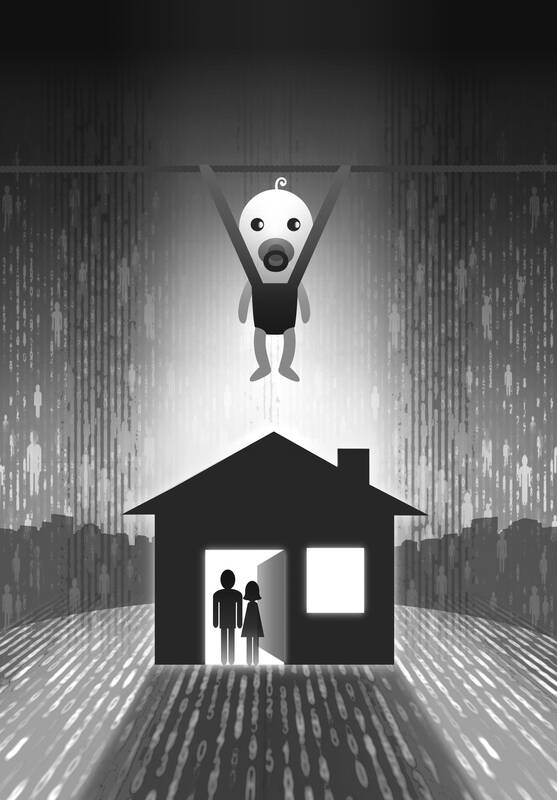In 2015, I found myself advising Poland’s president on the nation’s demographic woes: The country’s birthrate had stalled at 1.3 children per woman, one of the lowest in Europe. Most Polish couples wanted to have two kids, but settled for one. The reasons were predictable: precarious jobs, not enough childcare, apartment prices out of reach.
We were all, it turned out, fighting the wrong battle. In the decade since then, unemployment in Poland has sunk to one of the lowest in the EU. Incomes have more than doubled. Nursery and childcare places are multiplying. The government now channels almost 8 percent of the national budget into cash transfers known as the “800 Plus” program, so called because the state pays families 800 zlotys every month (US$220) for each dependent child.
During the same period, the population has shrunk by 1.5 million. A million new one-person households have materialized in the demographic ledger, quiet entries in a changing social contract. Last year, Poland’s birthrate collapsed to 1.1 — meaning it ranks among the world’s least fertile countries, beside war-scarred Ukraine. This year, it is poised to fall further, to 1.05.

Illustration: Yusha
The problem is not simply that Poles are having fewer children. Increasingly, they have no partners with whom to try. The latest phase of gender conflict impedes not only childbearing, but the very formation of couples — here understood as heterosexual unions — on which birth statistics still mostly rest.
For most of human history, being alone meant being dead. The word “loneliness” barely existed in English until the industrial age. At the dawn of the 20th century, only a tiny share of adults remained unmarried — fewer still in eastern Europe than in the west. In the lands of today’s Poland, scarcely 8 percent were single; in England, it was nearly twice that.
A century later, the balance has flipped. Nearly 50 percent of Poles under 30 are single. Another 20 percent are in relationships, but live apart. This generation, in particular those aged 18 to 24, surveys show, is more likely to feel lonely than any other — even more than Poles older than 75. Last year, almost two in five young men said they had not had sex for at least a year. Abstinence, too, has become partisan: right-leaning men and left-leaning women are the likeliest to be sexually inactive.
Young Poles are not just sleeping apart — they are scrolling apart. Seven in 10 have played the lottery of dating apps.
The promise of infinite possibility appears to have delivered infinite hesitation: Only 9 percent of young couples have actually met online. What appears, in statistics, as a fertility crisis seems, in lived experience, to be a crisis of connection.
Gender conflict — stoked by political polarization, dating algorithms and the clash between autonomy and intimacy — has swept much of the world. In post-communist Europe, the conflict feels more acute. Three forces combine to set the region apart: the dizzying speed of change, the rise of psychotherapy as cultural grammar and the legacy of communism itself.
Few regions have transformed with such vertigo. Since 1990, GDP per capita in Poland has risen eightfold, even adjusting for the cost of living. Since 2002, unemployment has fallen from 20 percent to 2.8 percent. Prosperity has altered both daily life and consciousness, upending generational life patterns and sparking a reckoning between the genders.
Changing times entail changing cultural norms. They also complicate the intergenerational exchange.
My grandma, who left school at 10, urged me to skip going to university at Cambridge lest I lose my sweetheart; my mom, who was one of the first college-educated nurses in our town, rooted for me to go, but warned against the UK student loan, insisting that it is wrong to live in debt — as if it were an aberration rather than a cornerstone of the economic order.
Far away in Krakow, at the opposite end of Poland — and of the social ladder — my partner’s parents, erudite professors, pressed him to polish his master’s thesis rather than risk launching a business that would one day thrive. For many of my friends, adulthood meant not learning from parents, but explaining the world to them.
The family, once imagined as Poland’s invulnerable core, has begun to fragment. When the Berlin Wall fell, less than 6 percent of children were born out of wedlock — almost five times fewer than in Britain. As that generation came of age, many chose distance over duty. Data on estrangement remain imperfect, but by one estimate up to one in four Poles under 45 has no contact with their father; up to one in 13 is cut off from their mother. When parents no longer serve as role models, stepping into parenthood yourself becomes an act of improvisation.
What the family and the church once provided, the therapist’s couch now supplies. Raised on a low-calorie emotional diet, many Poles have turned to psychotherapy. A decade ago, it was taboo. Today, public health providers report a 145 percent surge in psychological consultations in 10 years. Private practitioners, where most patients actually seek help, boast of growth rates that would make venture capitalists envious. The shift is cultural as much as clinical: At glossy business summits, the keynote is as likely to be Esther Perel as it is a billionaire founder. Parliament now debates how to regulate what critics call the wild west of the psychotherapeutic industry, where virtuosos of soul-searching mingle with peddlers of life hacks.
The 22 percent of Poles who rushed to couches in the past five years are disproportionately young, female and unmarried. They emerge fluent in the language of “self-care,” “needs” and “boundaries,” directed toward men who often respond in the idiom of “duties,” “norms” and “expectations.”
Behind the drama lies a paradox peculiar to post-communist Europe: It is at once more and less gender-equal than the West. Communism, in rejecting the bourgeois model of the family, propelled women into full employment and higher education, a policy that left Poland with one of the EU’s smallest gender-pay gaps. By the 1980s, women already outnumbered men at universities. Yet in the private sphere — marriage, domestic labor, child-rearing — conservative norms endured. When women still seek partners with equal or higher status, but in a society where they get two out of three university diplomas, the numbers no longer add up.
Men and women are literally in different places too: Internal migration has shifted the balance so that in the country’s largest cities — such as Warsaw, Lodz and Krakow — there are at least 110 women for every 100 men. Men are more likely to stay in smaller towns, away from the new economy and new norms.
And so, Poland’s baby deficit is not something that can be remedied with cash bonuses, cheaper mortgages or subsidized childcare. What is faltering in the first place is not the willingness to raise a child, but the capacity to build a life with someone.
Beneath Poland’s economic boom lurks what could be called the new generation’s Ingmar Bergman moment: a quiet crisis not of war or want, but of silence — of how to live together, how to find each other, how to sustain intimacy in a nation where people have learned all too well how to thrive on their own.
Anna Gromada is an assistant professor at the Polish Academy of Sciences in Warsaw and a policy adviser to international organizations.

There has been much catastrophizing in Taiwan recently about America becoming more unreliable as a bulwark against Chinese pressure. Some of this has been sparked by debates in Washington about whether the United States should defend Taiwan in event of conflict. There also were understandable anxieties about whether President Trump would sacrifice Taiwan’s interests for a trade deal when he sat down with President Xi (習近平) in late October. On top of that, Taiwan’s opposition political leaders have sought to score political points by attacking the Lai (賴清德) administration for mishandling relations with the United States. Part of this budding anxiety
The diplomatic dispute between China and Japan over Japanese Prime Minister Sanae Takaichi’s comments in the Japanese Diet continues to escalate. In a letter to UN Secretary-General Antonio Guterres, China’s UN Ambassador Fu Cong (傅聰) wrote that, “if Japan dares to attempt an armed intervention in the cross-Strait situation, it would be an act of aggression.” There was no indication that Fu was aware of the irony implicit in the complaint. Until this point, Beijing had limited its remonstrations to diplomatic summonses and weaponization of economic levers, such as banning Japanese seafood imports, discouraging Chinese from traveling to Japan or issuing
On Nov. 8, newly elected Chinese Nationalist Party (KMT) Chairwoman Cheng Li-wun (鄭麗文) and Vice Chairman Chi Lin-len (季麟連) attended a memorial for White Terror era victims, during which convicted Chinese Communist Party (CCP) spies such as Wu Shi (吳石) were also honored. Cheng’s participation in the ceremony, which she said was part of her efforts to promote cross-strait reconciliation, has trapped herself and her party into the KMT’s dark past, and risks putting the party back on its old disastrous road. Wu, a lieutenant general who was the Ministry of National Defense’s deputy chief of the general staff, was recruited
Tokyo-Beijing relations have been rapidly deteriorating over the past two weeks as China tries to punish Japan over Japanese Prime Minister Sanae Takaichi’s remarks about Taiwan earlier this month, and the off-ramp to this conflict is yet to be seen. Takaichi saying that a “Taiwan contingency” could cause a “situation threatening Japan’s survival” — which would allow Japan to act in self-defense — has drawn Beijing’s ire and sparked retaliatory measures. Her remark did not gain public attention until Chinese Consul General in Osaka Xue Jian (薛劍) made an apparent threat to behead her. The two sides lodged protests against each